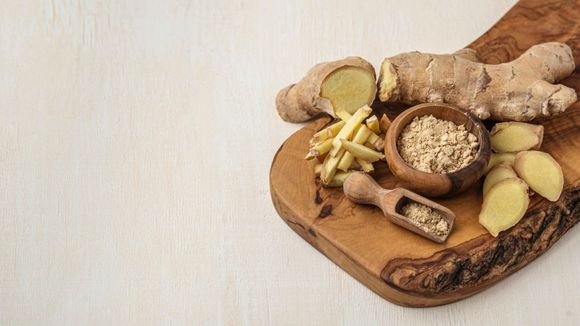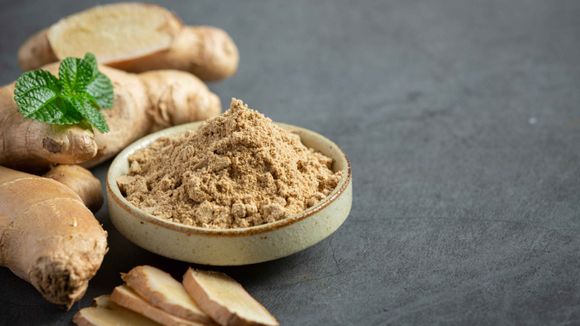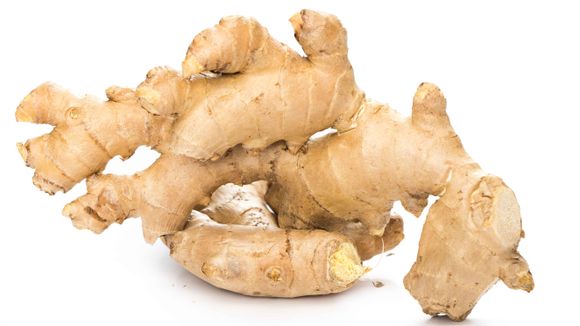General information about ginger
Ginger (Zingiber officinale), also called by other names - isiot, ginger, is a plant with well-leafed stems and yellowish-green flowers. The ginger spice comes from the roots of the plant. Ginger is native to warmer parts of Asia, such as China, Japan, and India, but is also grown in parts of South America and Africa. It is also grown in the Middle East to be used as medicine and as food.
Ginger is commonly used to relieve stomach problems, including nausea, colic, upset stomach, flatulence, diarrhea, irritable bowel syndrome (IBS). Its use has been documented for nausea caused by cancer treatment, nausea caused by HIV/AIDS treatment, nausea and vomiting after surgery, and loss of appetite.
Other uses include pain relief in rheumatoid arthritis, osteoarthritis, menstrual pain, upper respiratory tract infections, cough, respiratory problems, migraine headaches, bronchitis, and diabetes.
Ginger is also sometimes used for chest pain, low back pain, and stomach pain, to stimulate breast milk, and as a diuretic. It is interesting to find out what active components are due to all the above applications of ginger, as well as whether there are other areas of application.
Amazing Benefits of Ginger Backed by Scientific Research
Contains phenolic compounds with powerful healing properties

Ginger has a very long history of use in various forms of traditional and alternative medicine. It is used to aid digestion, reduce nausea, and fight the flu and the common cold as some of its main areas of utility.
The unique aroma and taste of ginger comes from its natural oils, the most important of which is gingerol. Gingerol is the main bioactive compound in ginger. It is responsible for much of the healing properties of ginger.
Gingerol has powerful anti-inflammatory and antioxidant effects, according to various scientific studies. For example, it can help reduce oxidative stress that results from the presence of an excessive amount of free radicals in the body. [ref. 1]
In other studies, the immunomodulatory and anti-inflammatory therapeutic potential of gingerols and their nanoformulations have been described. 3 The phenolic compounds found in ginger in general are mainly gingerols, shogaols and paradolas. Gingerols are the main phenolic compounds found in fresh ginger and contain mainly 6-gingerol, as well as 4-, 5-, 8-, 10- and 12-gingerols. Gingherols possess a wide range of bioactivities, such as antioxidants and anticancer agents.
Focus on the anti-cancer action of gingerols in ginger
In connection with anticancer activity, gingerols have been found to exhibit anticancer activity as immunomodulators due to their anti-inflammatory, antioxidant, apoptotic, antiangiogenic and antimetastatic effects. Studies have shown that 6-gingerol targets molecular signaling pathways that could potentially be used to treat cancer. 4
In another study, 6-gingerol was demonstrated to inhibit epidermal growth factor-induced activating protein 1 (AP-1), which has an important effect on tumor promotion. Cell migration and motility were significantly reduced at increasing concentrations in breast cancer cells (MDA-MB-231) treated with 6-gingerol. 5
The effects of 6-gingerol on MMP proteins, which are possible mediators of invasion and metastases in some cancer cells, have demonstrated its ability to suppress adhesion, invasion and motility in MDA-MB-231 cells. A scientific team confirms that 6-gingerol suppresses MMP-2 levels by reducing nuclear levels of a protein bound to a YAP protein that acts as a promoter in tumor metastases in many cancers. 6
In yet another study, 6-gingerol was shown to reduce the viability of human promyelocytic leukemia (HL-60) cells, has an inhibitory effect on DNA synthesis, and is responsible for apoptotic cell death. 7
Studies have also demonstrated the potential of gingerols to be an effective chemopreventive agent for colorectal cancer with their anti-inflammatory properties. A team of scientists revealed that 6-gingerol generated significant cell cycle arrest and death in the colorectal cancer cell lines LoVo and HCT116 by inhibiting cyclin D1, cyclin A, and cyclin B1. 8
Ginger in various forms of nausea
Ginger seems to be very effective against nausea as an unpleasant health problem. It can help relieve nausea and vomiting in people undergoing certain types of surgeries or procedures. Ginger may also help with chemotherapy-related nausea, but larger human studies are needed to prove these effects.
Ginger May Play a Role in Weight Loss

A 2019 review of the scientific literature concluded that ginger supplements may help significantly reduce body weight and waist-to-hip ratio in overweight or obese people. 9
A 2016 study of 80 obese women found that ginger can also help reduce body mass index (BMI) and insulin levels in the blood. Another 2019 study of functional foods also concluded that ginger has a positive effect on obesity and weight loss. However, further studies are needed in this direction.
Ginger to lower blood sugar
This area of research is relatively new, but ginger has the potential for potent antidiabetic properties. In a 2015 study of 41 participants with type 2 diabetes, 2 grams of ginger powder per day lowered fasting blood sugar by 12%. 10 In addition, it dramatically improves hemoglobin A1c (HbA1c), a marker of long-term blood sugar levels. HbA1c was reduced by 10% over a 12-week period.
There was also a 28% reduction in the apolipoprotein B/apolipoprotein A-I ratio and a 23% reduction in malondialdehyde (MDA), which is a byproduct of oxidative stress. A high ApoB/ApoA-I ratio and high levels of MDA are major risk factors for heart disease. Keep in mind, however, that this is only a small study. The results are impressive, but more in-depth data is needed.
Ginger can significantly reduce menstrual pain

Dysmenorrhea refers to pain felt during the menstrual cycle.
One of the traditional uses of ginger is to relieve pain, including menstrual pain.
In a 2009 study, 150 women were instructed to take ginger or a nonsteroidal anti-inflammatory drug (NSAID) during the first 3 days of their menstrual cycle. The three groups received four daily doses of ginger powder (250 mg), mefenamic acid (250 mg) or ibuprofen (400 mg). Ginger manages to reduce pain as effectively as the two NSAIDs.
More recent studies have also shown that ginger is more effective than placebo and just as effective as drugs such as mefenamic acid and acetaminophen/caffeine/ibuprofen. 11
Other known health benefits of ginger (Zingiber officinale)
To a lesser extent, the following health benefits of ginger have been studied:









